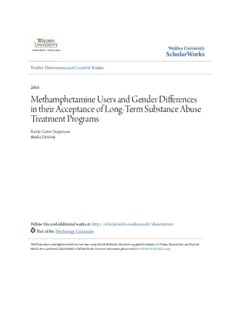Table Of ContentWalden University
ScholarWorks
Walden Dissertations and Doctoral Studies
Walden Dissertations and Doctoral Studies
Collection
2016
Methamphetamine Users and Gender Differences
in their Acceptance of Long-Term Substance Abuse
Treatment Programs
Kevin Garen Stepanyan
Walden University
Follow this and additional works at:https://scholarworks.waldenu.edu/dissertations
Part of thePsychology Commons
This Dissertation is brought to you for free and open access by the Walden Dissertations and Doctoral Studies Collection at ScholarWorks. It has been
accepted for inclusion in Walden Dissertations and Doctoral Studies by an authorized administrator of ScholarWorks. For more information, please
[email protected].
Walden University
College of Social and Behavioral Sciences
This is to certify that the doctoral dissertation by
Kevin Stepanyan
has been found to be complete and satisfactory in all respects,
and that any and all revisions required by
the review committee have been made.
Review Committee
Dr. Joseph Grillo, Committee Chairperson, Psychology Faculty
Dr. Michael Plasay, Committee Member, Psychology Faculty
Dr. Victoria Latifses, University Reviewer, Psychology Faculty
Chief Academic Officer
Eric Riedel, Ph.D.
Walden University
2016
Methamphetamine Users and Gender Differences in their Acceptance of Long-Term
Substance Abuse Treatment Programs
by
Kevin G. Stepanyan
B.A., California State University, Los Angeles, 2005
M.S., California State University, Los Angeles, 2007
Dissertation Submitted in Partial Fulfillment
of the Requirements for the Degree of
Doctor of Philosophy
Clinical Psychology
Walden University
November 2016
Abstract
Methamphetamine abuse is a problem of public health importance among men
and women in the United States. The two genders are affected even though the majority
treatment programs are tailored for male alcohol addicts. The gender differences are
prevalent in the acceptance of long-term substance abuse treatment programs. The study
focuses on gender differences in methamphetamine abuse and whether both male and
female addicts benefit from treatment. Respondent’s suitability, participant’s abuse
condition, treatment, and progress questionnaires and interviews are used to collect data
from 50 male and 50 female methamphetamine users at the Impact Residential Program
in Montreal, Canada. Together, the four quantitative questionnaires yield common factors
leading to methamphetamine abuse as weight loss and emotional stress for females, and
increased physical activity for males. Descriptive statistics of median and quartiles are
used to help describe outcomes of the treatment program. Stigma is identified as a
common barrier to seeking treatment for both genders. Furthermore, parenting and
childcare are not identified as barriers for females seeking treatment contrary to previous
research findings but pregnancy is a key motivator to seeking treatment. The median and
quartile descriptions reveal that both male and female methamphetamine abusers benefit
equally from treatment programs. The findings of this study add knowledge on gender-
specific efforts against methamphetamine abuse. Public health officers may use identified
factors leading to methamphetamine use to foster preventive measures while officers
working in treatment programs may use identified motivators and barriers to treatment to
enhance program effectiveness.
Methamphetamine Users and Gender Differences in their Acceptance of Long-Term
Substance Abuse Treatment Programs
by
Kevin G. Stepanyan
B.A., California State University, Los Angeles, 2005
M.S., California State University, Los Angeles, 2007
Dissertation Submitted in Partial Fulfillment
of the Requirements for the Degree of
Doctor of Philosophy
Clinical Psychology
Walden University
November 2016
Dedication
This work is dedicated to all persons working in substance abuse treatment
programs in the United States and its territories for their great work in saving generations.
Acknowledgments
Completion of this thesis was made possible by invaluable support, guidance and
encouragement from a number of people. Firstly, I am especially grateful to my research
advisor and Chair, Professor Dr. Joseph Grillo, secondary committee member, Dr.
Michael Plasay, and URR, Dr. Victoria Latifses for their availability and constructive
input in developing this thesis. Secondly, I am grateful to my family for providing
laughter even in difficult times. Finally, I thank everyone who contributed in data
collection and analysis for my thesis.
Table of Contents
List of Tables .......................................................................................................................v
List of Figures .................................................................................................................... vi
Chapter 1: Introduction to the Study ....................................................................................1
Background Information ................................................................................................1
Statement of the Problem ...............................................................................................5
Purpose of the Study ......................................................................................................6
Research Questions and Hypotheses .............................................................................7
Study Objectives ............................................................................................................7
Nature of the Study ........................................................................................................8
Significance of the Study ...............................................................................................9
Research Assumptions .................................................................................................10
Study Limitations .........................................................................................................11
Definition of Terms......................................................................................................11
Summary and Transition ..............................................................................................13
Chapter 2: Literature Review .............................................................................................14
Synopsis .......................................................................................................................14
Effects of Methamphetamine Use ................................................................................15
Characteristics of People Who Use Methamphetamine...............................................18
Gender Differences in Reasons for Abuse and Addiction ...........................................18
Treatment Response Based on Gender ........................................................................20
i
Factors Affecting Different Genders in Responding to Long-Term Treatment
Programs ..........................................................................................................23
Diverse Treatment Needs Meant for the Different Genders in Long-Term
Substance/ Drug Abuse Treatment Programs ..................................................25
Relapse During and After Treatment ...........................................................................29
Treatment Outcomes ....................................................................................................30
Methamphetamine-Related Morbidity .........................................................................32
Conclusion ...................................................................................................................33
Chapter 3: Research Method ..............................................................................................34
Introduction ..................................................................................................................34
Research Philosophy ....................................................................................................34
Research Design...........................................................................................................36
Research Strategies ......................................................................................................39
Research Variables and Instrument .............................................................................42
Instrumentation and Materials .....................................................................................45
Questionnaire A: Respondent’s suitability assessment guide. .............................. 46
Questionnaire B: Participant’s abuse condition assessment. ................................ 46
Questionnaire C: Treatment. ................................................................................. 48
Questionnaire D: Progress. ................................................................................... 48
Questionnaire E: Summative evaluation. .............................................................. 49
Setting and Sample Size Determination ......................................................................49
Inclusion Criteria .........................................................................................................50
ii
Data Collection ............................................................................................................51
Data Analysis ...............................................................................................................52
Chapter 4: Results ..............................................................................................................54
Introduction ..................................................................................................................54
Phase 1 .........................................................................................................................54
Phase 2 .........................................................................................................................55
Demographics ....................................................................................................... 55
Reasons for Using Methamphetamine .................................................................. 59
Source of knowledge on methamphetamine ......................................................... 65
Daily Consumption ............................................................................................... 67
Effects of Methamphetamine ................................................................................ 68
Effect of Methamphetamine use on Social and Psychosocial Functioning .......... 72
Phase 3: Treatment .......................................................................................................73
Motivators to seek treatment ................................................................................. 74
Barriers to Seeking Treatment .............................................................................. 76
Preferred Treatment Modality............................................................................... 77
Perceived Effectiveness of Current Treatment Method ........................................ 80
Current Health ....................................................................................................... 81
Preference to Continue with Treatment ................................................................ 82
Satisfaction with Treatment and Support Services Thereto .................................. 84
Chapter 5: Discussion, Conclusions, and Recommendations ............................................86
Discussion ....................................................................................................................86
iii
Description:condition, treatment, and progress questionnaires and interviews are used to from 50 male and 50 female methamphetamine users at the Impact However, there is little comprehensive research that has been carried out .. attitudes, feelings and behaviors that a given culture associates with a

